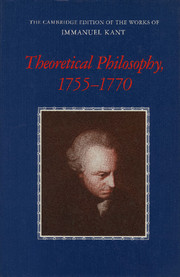Book contents
- Frontmatter
- Contents
- General editors' preface
- Preface
- Guide to abbreviations
- General introduction
- Introductions to the translations
- Résumés of the works
- A NEW ELUCIDATION OF THE FIRST PRINCIPLES OF METAPHYSICAL COGNITION (1755)
- THE EMPLOYMENT IN NATURAL PHILOSOPHY OF METAPHYSICS COMBINED WITH GEOMETRY, OF WHICH SAMPLE I CONTAINS THE PHYSICAL MONADOLOGY (1756)
- AN ATTEMPT AT SOME REFLECTIONS ON OPTIMISM (1759)
- THE FALSE SUBTLETY OF THE FOUR SYLLOGISTIC FIGURES (1762)
- THE ONLY POSSIBLE ARGUMENT IN SUPPORT OF A DEMONSTRATION OF THE EXISTENCE OF GOD (1763)
- ATTEMPT TO INTRODUCE THE CONCEPT OF NEGATIVE MAGNITUDES INTO PHILOSOPHY (1763)
- INQUIRY CONCERNING THE DISTINCTNESS OF THE PRINCIPLES OF NATURAL THEOLOGY AND MORALITY (1764)
- M. IMMANUEL KANT'S ANNOUNCEMENT OF THE PROGRAMME OF HIS LECTURES FOR THE WINTER SEMESTER 1765 — 1766 (1765)
- DREAMS OF A SPIRIT-SEER ELUCIDATED BY DREAMS OF METAPHYSICS (1766)
- Preamble, which promises very little for the execution of the project
- The first part, which is dogmatic
- First chapter A tangled metaphysical knot, which can be either untied or cut as one pleases
- Second chapter A fragment of occult philosophy, the purpose of which is to reveal our community with the spirit-world
- Third chapter Anti-Cabbala – a fragment of ordinary philosophy, the purpose of which is to cancel community with the spirit-world
- Fourth chapter Theoretical conclusion established on the basis of all the observations contained in the first part
- The second part, which is historical
- CONCERNING THE ULTIMATE GROUND OF THE DIFFERENTIATION OF DIRECTIONS IN SPACE (1768)
- ON THE FORM AND PRINCIPLES OF THE SENSIBLE AND THE INTELLIGIBLE WORLD [INAUGURAL DISSERTATION] (1770)
- Factual notes
- Bibliographies of editions and translations
- Glossary
- Biographical-bibliographical sketches of persons mentioned by Kant
- Index
Third chapter - Anti-Cabbala – a fragment of ordinary philosophy, the purpose of which is to cancel community with the spirit-world
Published online by Cambridge University Press: 18 December 2014
- Frontmatter
- Contents
- General editors' preface
- Preface
- Guide to abbreviations
- General introduction
- Introductions to the translations
- Résumés of the works
- A NEW ELUCIDATION OF THE FIRST PRINCIPLES OF METAPHYSICAL COGNITION (1755)
- THE EMPLOYMENT IN NATURAL PHILOSOPHY OF METAPHYSICS COMBINED WITH GEOMETRY, OF WHICH SAMPLE I CONTAINS THE PHYSICAL MONADOLOGY (1756)
- AN ATTEMPT AT SOME REFLECTIONS ON OPTIMISM (1759)
- THE FALSE SUBTLETY OF THE FOUR SYLLOGISTIC FIGURES (1762)
- THE ONLY POSSIBLE ARGUMENT IN SUPPORT OF A DEMONSTRATION OF THE EXISTENCE OF GOD (1763)
- ATTEMPT TO INTRODUCE THE CONCEPT OF NEGATIVE MAGNITUDES INTO PHILOSOPHY (1763)
- INQUIRY CONCERNING THE DISTINCTNESS OF THE PRINCIPLES OF NATURAL THEOLOGY AND MORALITY (1764)
- M. IMMANUEL KANT'S ANNOUNCEMENT OF THE PROGRAMME OF HIS LECTURES FOR THE WINTER SEMESTER 1765 — 1766 (1765)
- DREAMS OF A SPIRIT-SEER ELUCIDATED BY DREAMS OF METAPHYSICS (1766)
- Preamble, which promises very little for the execution of the project
- The first part, which is dogmatic
- First chapter A tangled metaphysical knot, which can be either untied or cut as one pleases
- Second chapter A fragment of occult philosophy, the purpose of which is to reveal our community with the spirit-world
- Third chapter Anti-Cabbala – a fragment of ordinary philosophy, the purpose of which is to cancel community with the spirit-world
- Fourth chapter Theoretical conclusion established on the basis of all the observations contained in the first part
- The second part, which is historical
- CONCERNING THE ULTIMATE GROUND OF THE DIFFERENTIATION OF DIRECTIONS IN SPACE (1768)
- ON THE FORM AND PRINCIPLES OF THE SENSIBLE AND THE INTELLIGIBLE WORLD [INAUGURAL DISSERTATION] (1770)
- Factual notes
- Bibliographies of editions and translations
- Glossary
- Biographical-bibliographical sketches of persons mentioned by Kant
- Index
Summary
Aristotle somewhere says: When we are awake we share a common world, but when we dream each has a world of his own. It seems to me that one ought, perhaps, to reverse the final clause and be able to say: if different people have each of them their own world, then we may suppose that they are dreaming. On this basis, if we consider those who build castles in the sky in their various imaginary worlds, each happily inhabiting his own world to the exclusion of the others – if we consider, for example, the person who dwells in the world known as The Order of Things, a world tinkered together by Wolff from a small quantity of building-material derived from experience and a larger quantity of surreptitious concepts, or the person who inhabits the world which was conjured out of nothing by Crusius employing the magical power of a few formulae concerning what can and what cannot be thought – if we consider these people, we shall be patient with their contradictory visions, until these gentlemen have finished dreaming their dreams. For if they should eventually, God willing, awake completely, that is to say, if they should eventually open their eyes to a view which does not exclude agreement with the understanding of other human beings, then none of them would see anything which did not, in the light of their proofs, appear obvious and certain to everybody else as well. And the philosophers will all inhabit a common world together at the same time, such as the mathematicians have long possessed. And this important event must now be imminent, if we are able to believe certain signs and portents which made their appearance some while ago above the horizon of the sciences.
There is a certain affinity between the dreamers of reason and the dreamers of sense. The latter commonly include those who from time to time have dealings with spirits.
- Type
- Chapter
- Information
- Theoretical Philosophy, 1755–1770 , pp. 329 - 336Publisher: Cambridge University PressPrint publication year: 1992

